-
•
•
70 responses
The gospel instructs us in a certain way of being imperfect. Here, salvation turns on practicing what Elizabeth Bishop calls “the art of losing.” Jesus famously describes this art of losing in Matthew 5:48. “Be ye therefore perfect,” he says, “even as your Father which is in heaven is perfect.” Here, the term “perfection” indexes that “certain way” that is peculiar to both Jesus and the Father. The baseline meaning of perfection, of teleios, is completion. But what kind of completion? My suggestion is that, rather than burying Jesus’ teleios beneath layers of curdled metaphysics and ripe fantasy, we ought… Read More
-
•
•
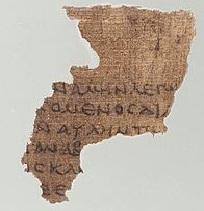
Chapter 9 Verse 1: Chapter 8 ends with the phrase “passed by” and chapter 9 begins with those words. Did the events of chapters 9-10 happen as Jesus was leaving the temple precincts, or did they occur later? (See verse 14 for a clue.) Why is it important that the man has been blind since birth? As you read the story, ask yourself, How we are like the blind man: in what ways are we or have we been blind from birth? How do we come to see? What do we see when we have been healed? Verses 2-5: How… Read More
-
•
•
25 responses
I wonder sometimes if our kids don’t think that “amen” means “thank heavens that’s over!” Read More
-
•
•
7 responses

Transcripts of the recent General Conference have been posted at LDS.org, including President Uchtdorf’s talk “Waiting on the Road to Damascus.” The talk was mostly a word of encouragement to those members of the Church who, for various reasons including self-doubt, are not full participants in their local wards. The focus of the talk was on the invitation to get past or around whatever the issue is, not on the details of the difficulties or doubts some people face. Of course, his comments on blogging and social media were the most interesting part of the talk. He made these comments… Read More
-
•
•
14 responses
A guest post from our friend and colleague emeritus, Russell Arben Fox. The title of this post isn’t a snark; it’s an open question, about which I am genuinely curious. (I’m also giving a presentation on this topic next week at the Midwest Sunstone/Restoration Studies conference, so my ulterior motive is a fishing expedition for anecdotes from the Collected Saints of the Bloggernacle.) Read More
-
•
•
46 responses

Agency is closely linked to power. Without power, we cannot make choices, and without choices we have no agency. It is by our power to help, to learn, to build that we exercise agency. Each of these — helping, learning, building — are forms of agency. (Agency is also closely linked to work and value, but I’ll come back to those later.) I’m fascinated by the idea of “forms of agency”. Most of us tend to exercise agency in only a very few forms, limited by our ignorance of the options available. For example, if you decided to bake muffins,… Read More
-
•
•
19 responses
I recently finished America’s Three Regimes: A New Political History (OUP, 2007) by Morton Keller, a retired history prof at Brandeis. The author suggests there have been three enduring American political regimes: a deferential-republican regime that lasted from the Revolution until the emergence of true party politics (Whigs and Democrats) during the 1830s; a party-democratic regime marked by strong party identification and increasing voter mobilization that lasted until roughly the Great Depression; and a populist-bureaucratic regime that saw the rise of big government, the rise of the independent media, and the decline of party identification and effectiveness. Can LDS history… Read More
-
•
•
4 responses
Not every scholar agrees (as if!), but some identify the following structure in Matthew’s Gospel: Read More
-
•
•
16 responses
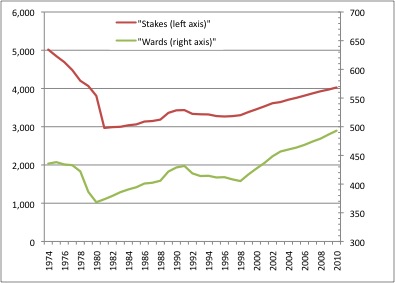
A couple of years ago my post The Implied Statistical Report, 2008, looked at what can be learned from a detailed examination of the data the Church releases each April Conference. This conferences’ data includes an additional statistic not found in earlier reports, the number of Church Service Missionaries, which led me to look again at the statistics to see if I might find something else. Read More
-
•
•
6 responses
This weekend at BYU, the Society for Mormon Philosophy and Theology will hold its 8th Annual Meeting on the theme, “Serving God with Our Minds—The Place of Philosophy, Theology, and Scholarship in a Prophetic Church.” Featured speakers include Patrick Mason, who will soon be taking the Howard W. Hunter Chair of Mormon Studies at Claremont, Alan Wilkins, a former Academic Vice President and currently Associate Director of the Faculty Center at BYU, and Jack Welch, Robert K. Thomas University Professor in the BYU Law School. Sessions will address themes including the role of theology in devotional life, prophets and continuing… Read More
-
•
•
42 responses
In his Sunday morning session remarks in general conference, President Monson told stories of great sacrifice offered to reach temples for sacred ordinances. He told of those in the Amazon who travel thousands of miles to the temple in Brazil. He told of the dedicated Tahitian man who — with his two sons — spent a total of six years, living away from the family, working in nickel mines to earn the money to get the family to the New Zealand temple. Given the recent local emphasis from the church on keeping families together, I was surprised to hear a… Read More
-
•
•
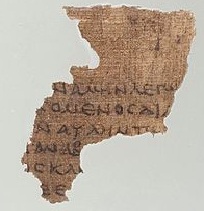
WARNING: Longer than usual notes. I agree with the generally accepted scholarly conclusion that John 7:53-8:11 is a later insertion into the original text. So I will deal with John 7:1-42 and John 8:12-59 as one narrative, the story of what Jesus does at the feast of the tabernacles. Then I will deal with the story of the woman taken in adultery separately. Chapter 7 Verses 1-5: In verse 1, to what is John referring with the phrase “these things”? Refer to the end of chapter 6 (e.g., John 6:66) to recall what things happened that caused him to be… Read More
-
•
•
5 responses
President Eyring conducted the last session of this April 2011 General Conference. Speakers included Elder Scott, Elder Christofferson, Carl B. Pratt, Lynn G. Robbins, Benjamin De Hoyos, C. Scott Grow, and Elder Holland. Readers are invited to leave a comment with their overall reaction to Conference and their sense of the general themes stressed by the speakers. Read More
-
•
•
2 responses
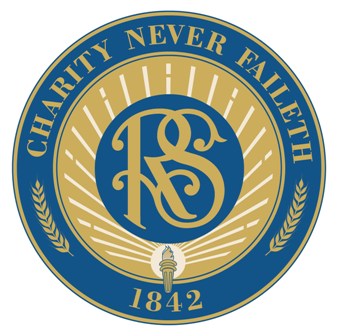
President Henry B. Eyring conducting. Discourses by President Dieter F. Uchtdorf, Elder Paul B. Johnson, Bishop H. David Burton, Sister Silvia H. Allred, Elder David A. Bednar and President Thomas S. Monson. Perhaps even more so than previous sessions, the theme of this session was the Church Welfare program. President Eyring mentioned the 75th anniversary of Church Welfare in his opening remarks, and the remarks of both Bishop Burton and Sister Allred focused on Welfare. Read More
-
•
•
10 responses

President Eyring conducted the Saturday evening Priesthood session, which offered talks by Elder Andersen, Steven E. Snow, Larry M. Gibson, President Uchtdorf, President Eyring, and President Monson. My notes below are basically summaries of the talks, but include rather loose paraphrases and a bit of commentary, so I have titled the post “Reflections on the Priesthood Session.” It was definitely one of the best priesthood sessions of recent years, and is notable for the rare absence of a major league anti-porn lecture. I would speculate that this reflects a desire to not push any more men away from church activity (I’m sure GAs know the gender gap statistics better than… Read More
-
•
•
5 responses

Pres. Uchtdorf conducted again, and following the customary audit report and statistical report, talks were given by Elder Boyd K. Packer, Elder Russell M. Nelson, Elder Russell J. Maynes, Elder Cecil O. Samuelsen, Elder Dallin H. Oaks and Elder M. Russell Ballard. Read More
-
•
•
8 responses
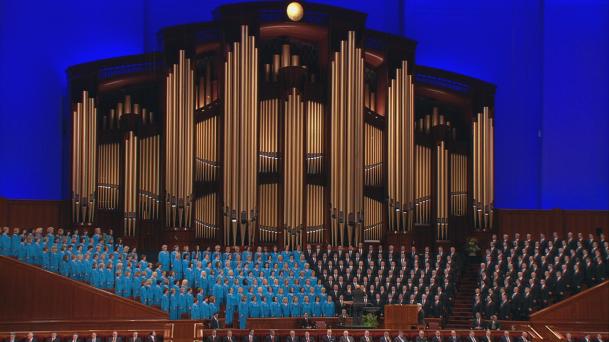
President Uchtdorf conducted the Saturday morning session, featuring talks by Elder Perry, Sister Jean A. Stevens, Walter F. Gonzalez, Kent. F. Richards, Elder Cook, and President Eyring, with brief remarks by President Monson. Direct quotations (based on my notes) are given in quotes; all other text represents my summary of the remarks given. Parenthetical comments and discussion notes at the end of the post in italics are my own editorial comments. Read More
-
•
•
102 responses
A few weeks ago, our ward’s Relief Society did a lesson on the fourteen fundamentals of following the prophet. As a result, I now have a copy of them hanging on my refrigerator. Putting away the leftover cheesecake after last night’s games of Magic, my eyes caught on #3: “The living prophet is more important to us than a dead prophet.” With General Conference (is that supposed to be capitalized?) nigh at hand, I got to wondering how we treat the words of the living prophets as compared to those of the dead prophets. So here’s my informal survey for… Read More
-
•
•
2 responses
Introduction to this series is here. I only prepared three this month in order to leave time for an Easter FHE (one of my favorites is here). Read More
-
•
•
17 responses
While we know that gospel principles are eternal, we must also admit that the language used to describe them changes over time. And now we have a tool for discovering and analyzing how Church leaders have changed their descriptions of the gospel over the past 160 years. Read More
-
•
•
6 responses
Eric D. Huntsman, God So Loved the World: The Final Days of the Savior’s Life, Deseret Book, 2011. Read More
-
•
•
19 responses
Imagine I’ve just been made supreme chancellor of a graduate program in Mormon theology. Thousands of students throng. We need a syllabus. What’s our first reading assignment? We’re going to start with Jim Faulconer’s dramatically subtitled essay “Rethinking Theology: The Shadow of the Apocalypse” from Faith, Philosophy, Scripture (Maxwell Institute, 2010). On my reading, Jim’s essay lays out a couple of basic principles for engaging in theology as quasi-academic meta-reflection on Mormonism: 1. Theology should be “apocalyptic.” Apocalypse does not so much refer to the end of the world . . . as it refers to the moment when the… Read More
-
•
•
106 responses
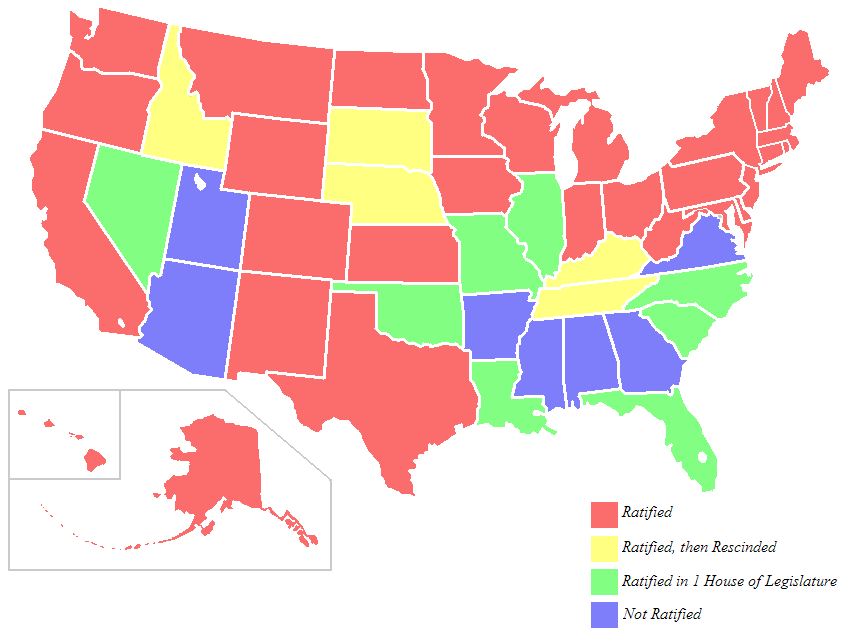
My earliest memory of conflict over Church decisions came because of a local stake division and boundary changes.I remember my mother venting about how one high councilor in one stake prevented the boundary change from following local political boundaries, which would have, in my mother’s view, give Church members a more unified voice in local politics. Read More
-
•
•
14 responses
Imagine your four favorite meals. Now imagine them cut into bite-sized pieces and combined into one dish. Read More
-
•
•
11 responses
The Greek word translated as “parable” means, basically, a comparison. A parable compares one thing with another. Read More
-
•
•
60 responses

Last year was major for Major League Mormons—or at least for one of them. This makes the third year that I have looked at what those of us who follow these Mormons want to know each April, and I’m wondering if I should look at this information more often. Read More
-
•
•
24 responses
As every tween knows, a hypocrite is someone who says one thing but does another. Read More
-
•
•
23 responses

After years of ignoring/making fun of it, I’ve finally gotten into Twitter. It lets me keep up with the people that I’m not close enough to to friend on Facebook. It also has cool feeds for things I’m interested in, but wouldn’t follow otherwise (like the new MESSENGER probe to Mercury and Cassini on Saturn. I love getting updates from our exploratory spacecraft! ). Once I got into it, I started looking for my bloggernacle friends and idols. I discovered (a) that it’s not easy to find people on Twitter, and (b) that in spite of the great Mormon blog… Read More
-
•
•
10 responses
(These are the notes for the talk I gave in sacrament yesterday.) Amanda When I returned from my mission in Japan, I was fired up about sharing the gospel. I wanted to be an effective member missionary. Back then, us missionaries had these big blue sheets of paper that we would use to plan our weeks. One side had a weekly schedule — Sunday, Monday, Tuesday… The other side had spaces for keeping track of the people you were teaching. On that side of the blue planner, you would keep a record of your progress in teaching each person —… Read More
-
•
•
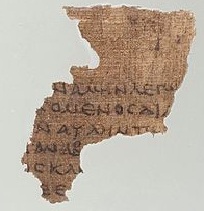
Matthew 18 Verses 1-4: Why do the disciples ask the question that they pose in verse 1? What does it suggest about their understanding of Jesus’ message? What do you make of the fact that they are arguing about who shall be first so shortly after Jesus has talked about his coming death (Matthew 17:22)? In verse 3, the verb “be converted” translates a Greek verb that means “turn.” To be converted, to repent, is to turn back, to return. In what sense is repentance a return? Christ says that no one can even enter the kingdom (or reign) of… Read More
